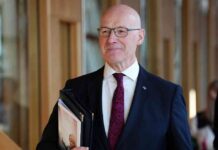The COP29 Summit is currently taking place in Azerbaijan, and Scottish observer Dr. Ben Wilson describes the conference as being on a “knife edge.” According to Dr. Wilson, it is essential for the planet that the talks do not collapse this week. He emphasizes that reaching an agreement is crucial not only for the climate but also for the hope of a peaceful world.
As a veteran of COP conferences, Dr. Wilson notes that this year’s event has seen an increased focus on global peace and security in relation to climate change. He explains that unresolved climate change can lead to conflicts over resources and forced migration on a global scale, causing significant disruptions worldwide. Additionally, he mentions that the current state of geo-politics, with the breakdown of the world order and nations prioritizing their own interests, adds complexity to the negotiations.
The conference has already faced controversy, with reports of a senior Azerbaijani official potentially arranging meetings to discuss fossil fuel deals. Azerbaijani president, Ilham Aliyev, defended natural gas as a “gift from God” and highlighted its importance in the market. This stance led Argentina, with substantial shale gas and oil reserves, to withdraw its negotiators, showcasing the challenges and differing priorities among participating countries.
One of the main objectives of COP29 is to establish a significant financial package to support global action on climate change. However, agreement on this matter seems distant, with developing countries proposing a target of $1.3 trillion per year from the Global North. Dr. Wilson notes that the lack of a public counter-offer from the Global North countries indicates internal disagreements on the proposed sum. The arrival of environment ministers this week may help bridge the gap between countries, but significant differences in positions remain a hurdle to reaching a consensus.
Despite the staggering figure of $1.3 trillion, Dr. Wilson emphasizes that the costs of inaction regarding climate change would be even higher. Citing estimates from the World Economic Forum, he underscores the urgent need to address global warming to prevent devastating financial and humanitarian consequences in the future. He stresses the importance of not allowing the talks to collapse and securing an agreement for the benefit of the climate and global peace.
In conclusion, the COP29 Summit in Azerbaijan faces critical challenges in reaching a consensus on financial support for climate change action. The involvement of environment ministers and ongoing negotiations will determine the outcome of the conference, with the hope of securing an agreement that addresses the urgent need for climate action while promoting a peaceful world for future generations.












